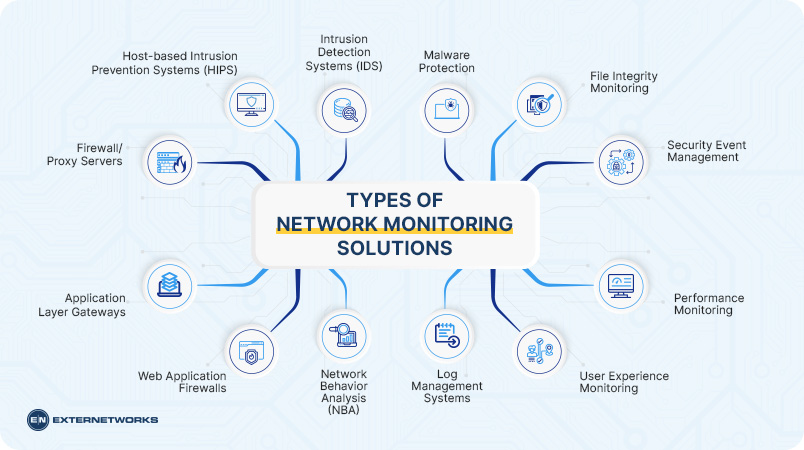Networking and Monitoring Services
Networking and monitoring services encompass a variety of tools and expertise that businesses leverage to ensure the smooth operation, security, and performance of their computer networks. Here’s a closer look at what these services entail
Networking Services
Network Design and Planning: These services involve designing and planning a network infrastructure that meets the specific needs and scalability requirements of a business. This includes selecting appropriate hardware, software, and network topologies.
Network Implementation: Qualified technicians physically install, configure, and test network devices like routers, switches, firewalls, and wireless access points. They ensure connectivity and proper functionality within the network.
Network Security Services: Securing a network is crucial. These services include vulnerability assessments, penetration testing, firewall management, and implementing intrusion detection and prevention systems to safeguard against cyber threats.
Network Management: Ongoing network management involves monitoring network performance, identifying and resolving network issues, and optimizing resource allocation.
Network Cabling: Proper network cabling infrastructure is essential. Services include installing and maintaining network cables (fiber optic, copper) to ensure reliable data transmission.
Network Implementation: Qualified technicians physically install, configure, and test network devices like routers, switches, firewalls, and wireless access points. They ensure connectivity and proper functionality within the network.
Network Security Services: Securing a network is crucial. These services include vulnerability assessments, penetration testing, firewall management, and implementing intrusion detection and prevention systems to safeguard against cyber threats.
Network Management: Ongoing network management involves monitoring network performance, identifying and resolving network issues, and optimizing resource allocation.
Network Cabling: Proper network cabling infrastructure is essential. Services include installing and maintaining network cables (fiber optic, copper) to ensure reliable data transmission.
Network Monitoring Services

Performance Monitoring: These services continuously monitor network performance metrics like bandwidth utilization, latency (response time), packet loss, and uptime. This allows for proactive identification and troubleshooting of potential network bottlenecks.
Device Monitoring: Monitoring the health and status of network devices (routers, switches, firewalls) is crucial. Alerts are set up to notify IT teams of any malfunctions or performance issues.
Security Monitoring: Security monitoring services track network activity for suspicious behavior and potential security breaches. They also involve log analysis to identify and address security threats.
Application Monitoring: Some services monitor the performance and availability of critical business applications running on the network. This helps ensure optimal application functionality for end users.
Device Monitoring: Monitoring the health and status of network devices (routers, switches, firewalls) is crucial. Alerts are set up to notify IT teams of any malfunctions or performance issues.
Security Monitoring: Security monitoring services track network activity for suspicious behavior and potential security breaches. They also involve log analysis to identify and address security threats.
Application Monitoring: Some services monitor the performance and availability of critical business applications running on the network. This helps ensure optimal application functionality for end users.
Benefits of Networking and Monitoring Services
-
- Improved Network Performance and Reliability: By proactively identifying and resolving network issues, these services ensure consistent network performance and minimize downtime.
- Enhanced Network Security: Security services help businesses protect their networks from cyberattacks, data breaches, and unauthorized access.
- Increased Efficiency and Productivity: A well-functioning network minimizes disruptions and allows employees to focus on their tasks without network-related issues.
- Reduced Costs: Proactive maintenance prevents costly network outages and downtime. Additionally, optimizing network performance can save on bandwidth costs.
- Better Decision-Making: Data collected through network monitoring provides valuable insights into network usage and performance, enabling data-driven decisions for network optimization and future planning.
Choosing a Networking and Monitoring Service Provider
- Expertise and Experience: Look for a provider with a proven track record and experience in similar network environments to your own.
- Security Focus: Ensure the provider prioritizes security and offers comprehensive security monitoring services.
- Scalability: Choose a provider that can scale its services to meet your growing network needs.
- 24/7 Support: Opt for a provider offering 24/7 monitoring and support to address network issues promptly.
- Cost and Transparency: Get clear proposals outlining the services offered, pricing structure, and service level agreements (SLAs).